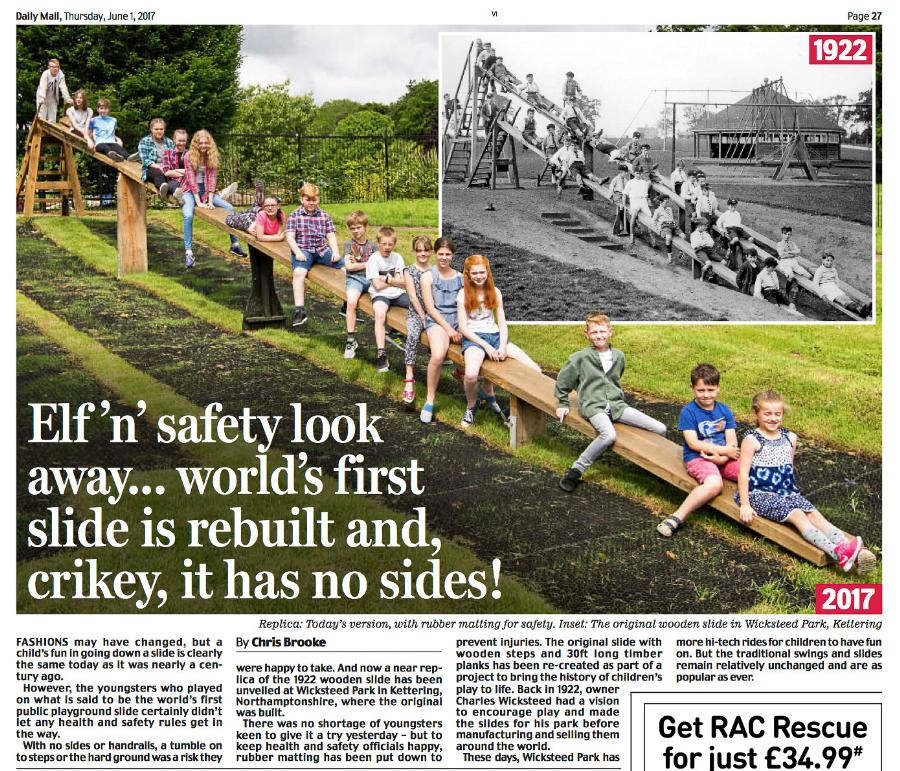The primitive piece of play equipment was originally constructed in 1921 in Wicksteed Park in Kettering, Northamptonshire – the first public park in the UK. It was designed by owner Charles Wicksteed, who initially made slides for his park as part of his vision to inspire and encourage play, then went on to manufacture and sell them around the world.
Now the iconic slide with wooden steps and 30ft long timber planks, has been re-created as part of the park’s project to bring the history of children’s play to life. It is based on original drawings of the first slide so modern-day children can experience the same thrills that their counterparts did back in the 1920s – and it has already proved a hit ahead of its official opening next month. The project has been overseen by Oliver Wicksteed, Charles’ great grandson and the chairman of Wicksteed Charitable Trust. The Trust was formed to ensure Charles’ work continued after his death and money towards the cost of the slide was raised at a ball to mark its centenary last year.
Oliver Wicksteed said: “This iconic structure will help us to tell the story of the development of children’s play, for which Wicksteed Park has been identified as of international significance. The story of the park and the man behind it has had a huge impact, not just locally, but in the whole way we treat parks and children’s play as a nation. Through physical interpretation and engagement we want to bring the history of the park alive to all visitors. In so doing everyone who visits will learn about our significant heritage and just how vital play is for the development of our children and the recreation of the first slide is part of that aim.”
Wicksteed, who was born in 1847 in Leeds, opened Wicksteed Park after the First World War because he wanted to give something back to the town he loved. His park allowed children to play freely and for families to enjoy outdoor life together. Before then, public parks were typically very formal places, where children were warned to keep off the grass. The joy the children got from his primitive swings and slides pushed him on to create more and more play equipment, which became so popular that it was exported around the world. The Wicksteed company catalogue for 1924 gives an illustration of the first slide and states that remarkably there were no accidents.
The description says: “The planks are faced with teak, and as this does not splinter it keeps a smooth glossy surface. The supposed wear and tear of the children’s clothes does not take place. If the plank were not smooth the children could not slide down, and if it is smooth no wear takes place. It was at first thought that children would hesitate about climbing so high a ladder; this has proved to be quite a mistake, they go up without fear or trembling, and we have never had an accident of any sort, although tens of thousands of sliders use them.”
Initially Wicksteed made separate slides for the boys and girls, which were labelled to avoid confusion. The children had to sit astride the wooden planks and hold onto the edges to stop themselves falling off. The division of the genders was common in early playgrounds but Wicksteed later became pioneering in breaking down the boundaries.
“I thought I would make a slide: first for the boys. This was so much appreciated that I made a better one for the girls: the boys got jealous of this, so I made a still better one for them,” he wrote in 1928. At that time I had a quaint idea that the boys and girls ought to be separated.”
By 1929 Wicksteed’s slide had become his most popular piece of play equipment. He developed the design so it was now made from steel and wood with a flat length at the end as we have today, so that children could slow down without shooting straight onto the ground.
He said: “These up-to-date slides... are curved at the bottom, ending in an almost horizontal plank of sufficient length to reduce the speed at the end of the slide to such an extent as to effectually prevent any danger in alighting. The slide is the most popular appliance we make. It will accommodate children at the rate of 20 a minute, which is a great feature. Parents enjoy seeing the sport, even when they don't join in it.”
Five years later his slides were completely made from metal with the added safety measure of handlebars, sides and a cabin at the top.
“If a child becomes nervous it need not go down the chute, but can remain on the platform until the steps are clear,” he said at the time.
In his 1928 book, A Plea for Children’s Recreation after School Hours and after School Age, Charles proclaimed: “I have good reason to believe that the park I have formed has changed the lives for the better, to a greater or lesser extent of thousands of children. I have direct evidence from mothers how whining, pale-faced children, complaining of any food they get, have come back with healthy faces and rosy complexions, ready to eat the house out after a good play in the playground.”
Wicksteed Park combines 147 acres of beautiful parkland with attractions such as rollercoasters and rides. It has a host of new attractions for 2017, including the fantastic new Sway Rider wave swing. As well as the slide Wicksteed is also credited with introducing one of the world’s first water chutes in 1926, which is now listed. It is one of only three still remaining in operation in the UK and was described as “being a bit like sitting in a skip and being thrown into a river.”
Our Story Appeared In


